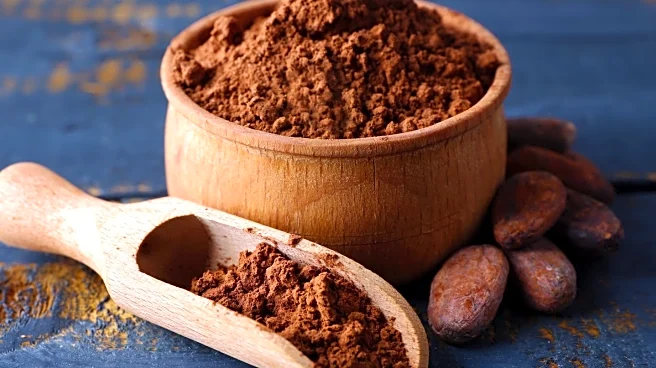What's Happening?
Researchers at Mass General Brigham have discovered that cocoa extract supplements, rich in flavanols, may reduce inflammation and help prevent age-related chronic diseases, including cardiovascular disease. The study involved analyzing five age-related markers of inflammation among participants who received daily cocoa supplements over several years. The results showed a decrease in hsCRP, an inflammatory marker associated with increased cardiovascular disease risk, among those taking the supplement. This finding suggests that cocoa extract's anti-inflammatory properties may contribute to its heart-protective effects. The research is part of the COSMOS trial, a large-scale study involving 21,442 participants over 60 years old, which found a 27% decrease in cardiovascular disease mortality due to cocoa extract supplementation.
Why It's Important?
The study highlights the potential of nutritional interventions, such as cocoa extract supplements, in slowing inflammatory aging, known as 'inflammaging.' This could have significant implications for public health, particularly in preventing cardiovascular diseases, which are a leading cause of death in the U.S. The research underscores the importance of food-based approaches to cardiovascular health, focusing on the benefits of cocoa flavanols found in plant-based foods like berries, tea, and grapes. By reducing inflammation, these supplements may offer a promising strategy for improving heart health and longevity, potentially reducing healthcare costs associated with age-related diseases.
What's Next?
The research team plans to continue evaluating the COSMOS trial to determine whether cocoa and multivitamin regimens can further curb inflammaging and other aging-related health outcomes. They aim to disentangle the effects of cocoa extract on cardiovascular health, particularly through improvements in hsCRP and reductions in incident hypertension. Additional studies are warranted to explore changes in other inflammaging markers, such as IL-6, which showed a small reduction in female participants. The findings may lead to broader recommendations for incorporating flavanol-rich foods into diets to enhance cardiovascular health.
Beyond the Headlines
The study emphasizes that cocoa extract supplements, rather than chocolate, are beneficial due to the bioactive components of the cocoa bean. Chocolate, often processed with excess calories and fat, lacks these key bioactives. The research advocates for a well-balanced diet with a variety of plant-based foods containing flavanols, highlighting the ethical dimension of promoting health through natural dietary sources rather than processed foods.










